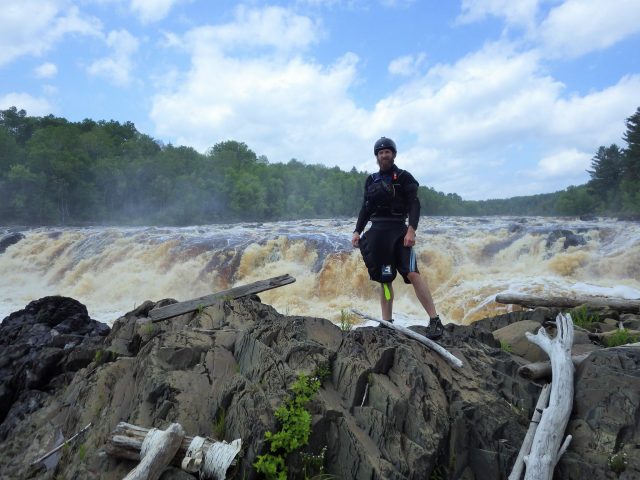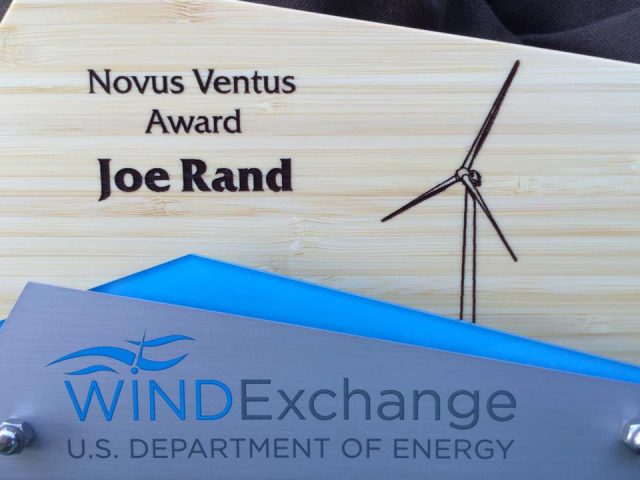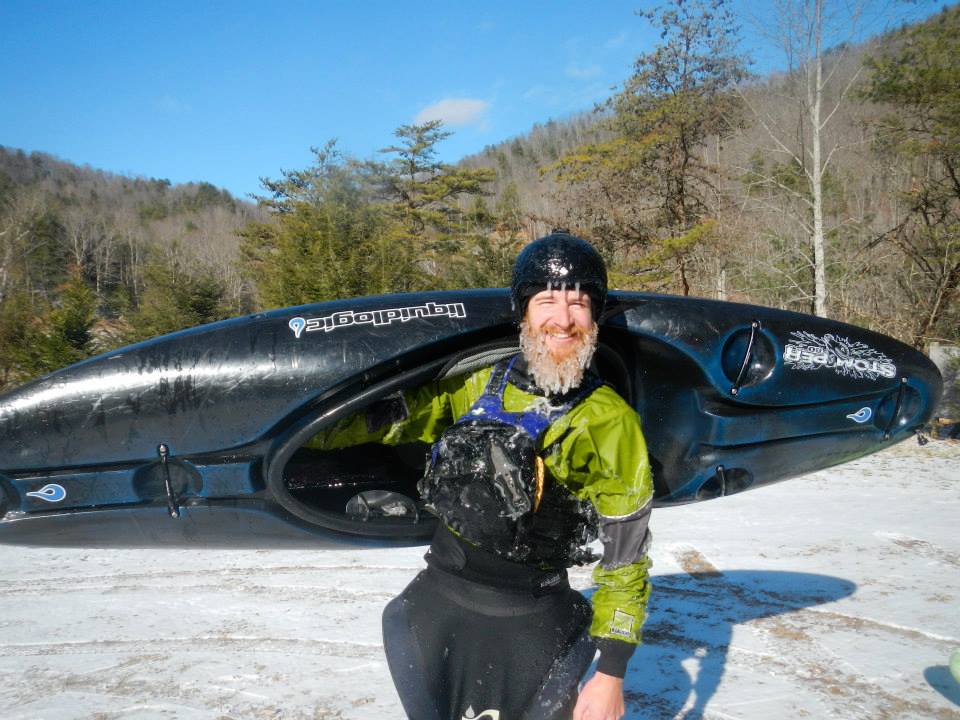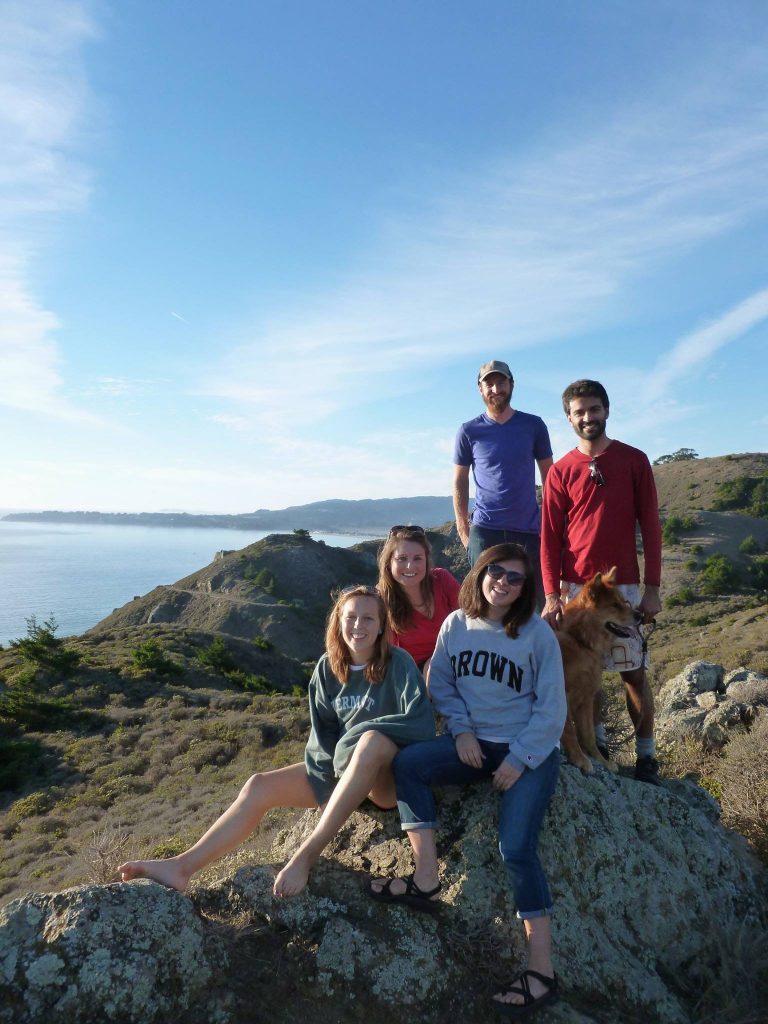“ERG gave me the freedom to jump onto a research project that fully captured my passion to examine how energy development and management impacts society and the environment. I did not feel constrained to work on a project that I was not committed to. ERG also positioned me to examine these questions with a broad, interdisciplinary lens. So I am not falling into the trap of only seeing one side of the issue”Read more about Joseph’s research and experience at ERG below.
 Joe on a kayaking trip on the St. Louis River in Minnesota
What have you been working on that most excites you?
Joe on a kayaking trip on the St. Louis River in Minnesota
What have you been working on that most excites you?
Being a whitewater kayaker, this project really piqued my interest.
I came to ERG expecting to focus my research on public acceptance of wind energy in the U.S. I was really fortunate to get a graduate student research (GSR) position at Lawrence Berkeley National Laboratory (LBNL) to contribute to a comprehensive, nationwide study on this subject. It has been really exciting for me to be a part of the research team on that project!
 Joe awarded for his work on wind power
However, doing that work with LBNL also opened up a door for me to pursue a completely different research topic for my master’s research. Last year, I got plugged in with some environmental non-governmental organizations (NGOs) doing economic cost-benefit analysis on the relicensing of a large hydropower project here in California. Being a whitewater kayaker, this project really piqued my interest. So I turned this work into my master’s project, and have been loving it.
Joe awarded for his work on wind power
However, doing that work with LBNL also opened up a door for me to pursue a completely different research topic for my master’s research. Last year, I got plugged in with some environmental non-governmental organizations (NGOs) doing economic cost-benefit analysis on the relicensing of a large hydropower project here in California. Being a whitewater kayaker, this project really piqued my interest. So I turned this work into my master’s project, and have been loving it.
 Joe frozen after a kayaking trip on the Watauga River in North Carolina
In a nutshell, I am examining the costs in lost generation and revenue to the hydropower operator if a new license required more environmentally protective flows below the dam. Historically, in the relicensing process, these types of analyses have been very coarse and did not accurately model complex power markets. So we’ve been able to get a clearer picture about exactly how much the environmental flows would cost the licensee. That was powerful to me because it was not only intellectually interesting but also had an impact in the actual relicensing negotiations for this project.
Now, I’ve been extending that initial analysis to try to better understand a couple other big questions related to the relicensing decision:
Joe frozen after a kayaking trip on the Watauga River in North Carolina
In a nutshell, I am examining the costs in lost generation and revenue to the hydropower operator if a new license required more environmentally protective flows below the dam. Historically, in the relicensing process, these types of analyses have been very coarse and did not accurately model complex power markets. So we’ve been able to get a clearer picture about exactly how much the environmental flows would cost the licensee. That was powerful to me because it was not only intellectually interesting but also had an impact in the actual relicensing negotiations for this project.
Now, I’ve been extending that initial analysis to try to better understand a couple other big questions related to the relicensing decision:
- If we reduce hydropower generation to provide environmentally protective flows, some quantity of electric demand will be re-dispatched to natural gas, leading to carbon emissions. I am quantifying the greenhouse gas (GHG) impacts of this decision and considering the value of local environmental and social benefits from these managed flows versus the global environmental and social costs of the increased GHG emissions.
- How might climate change impact hydropower generation and revenue at this project over the course of a new 30-50 year operating license? Federal Energy Regulatory Commission (FERC) regulators currently do not consider climate change AT ALL in the process of hydropower relicensing, but it is very likely to have significant impacts on a near-term time scale.
 Joe with other ERGies
Joe with other ERGies
- Search broadly for funding—and don’t give up. There are a lot of opportunities, even though it can seem sparse at times. And ERGies are very fund-able! You just need to find the opportunity that is right for you.
- Meet regularly with faculty—not just your adviser. Make an effort to share your work and get insights from a range of ERG faculty (core and affiliates). They will each have very interesting angles and recommendations for you. Don’t get stuck only talking to one adviser!
- Pick a research project that is genuinely interesting to you. There is no reason to spend this much time doing something if you don’t deeply care about it.
- Use the network. The ERG community is big, brilliant, and very supportive. Don’t be shy about reaching out to ERG alumni.
 Bullard’s Bar Dam (Image source: J. Smith)
Who have you been working with at ERG and how has this experience been?
At ERG I’ve worked most closely with my primary adviser, Duncan Callaway. My work does not exactly align with most of Duncan’s work, but I think he is really skilled at asking interesting questions and providing some direction—even outside of his main expertise. Also, since Duncan led our ERG Master’s Seminar series, it was easiest to develop a relationship with him and my research.
Also, I have to say that my Master’s cohort is great, too. I think this is one of the greatest strengths of ERG: the inspiration and support you can draw from your peers. Master’s Seminar with these guys was very helpful, and it is always fun and productive to bounce ideas around or hear about their projects.
I’ve also been working a lot with ERG alumni at LBNL. I’m surrounded by ERG graduates: Ryan Wiser, Andrew Mills, Naim Darghouth, Jo Seel, etc. I love working with these guys. They are really inspiring and demonstrate high-quality research. It is an honor to contribute a little bit to this team and fun to follow in their footsteps.
What you see yourself doing next?
Bullard’s Bar Dam (Image source: J. Smith)
Who have you been working with at ERG and how has this experience been?
At ERG I’ve worked most closely with my primary adviser, Duncan Callaway. My work does not exactly align with most of Duncan’s work, but I think he is really skilled at asking interesting questions and providing some direction—even outside of his main expertise. Also, since Duncan led our ERG Master’s Seminar series, it was easiest to develop a relationship with him and my research.
Also, I have to say that my Master’s cohort is great, too. I think this is one of the greatest strengths of ERG: the inspiration and support you can draw from your peers. Master’s Seminar with these guys was very helpful, and it is always fun and productive to bounce ideas around or hear about their projects.
I’ve also been working a lot with ERG alumni at LBNL. I’m surrounded by ERG graduates: Ryan Wiser, Andrew Mills, Naim Darghouth, Jo Seel, etc. I love working with these guys. They are really inspiring and demonstrate high-quality research. It is an honor to contribute a little bit to this team and fun to follow in their footsteps.
What you see yourself doing next?
I think if you told me two years ago that I would graduate from ERG and walk immediately into full-time work with the Electricity Markets and Policy Group at LBNL, I would have laughed out loud. But here we are.
I am committed to continuing my work with LBNL next year, which is really fantastic. I will continue to work on the public acceptance of wind energy project, as well as some research on residential real-estate impacts from third-party-owned solar PV, and a couple other renewable energy projects.
I think if you told me two years ago that I would graduate from ERG and walk immediately into full-time work with the Electricity Markets and Policy Group at LBNL, I would have laughed out loud. But here we are. I feel really lucky, but I’ve also worked hard for it. I have to say that being a full-time Master’s student and keeping a part-time GSR up at the lab, while also trying to find time to work on a separate Master’s project was a challenge at times. But it was worth it. I’m pretty excited to get back to the 40-hour work week and to get my nights and weekends back.
In the future, I would really like to pick up some more hydropower work. LBNL does not currently do a lot of hydro work, so I may try to bring some in or pick up some external contracting work on this topic. If anyone has any leads here let me know!
Joe kayaking in the Grand Canyon